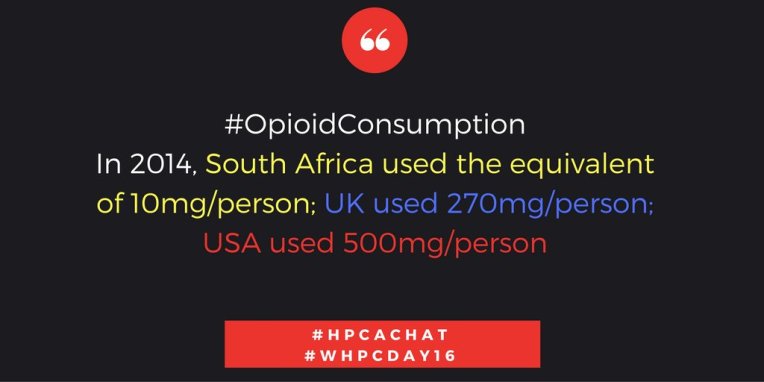 Tomorrow, the 8th October is World Hospice and Palliative Care Day; the theme this year is ‘Living and Dying in Pain: it doesn’t have to happen’. So why does it?
Tomorrow, the 8th October is World Hospice and Palliative Care Day; the theme this year is ‘Living and Dying in Pain: it doesn’t have to happen’. So why does it?
75% of the world’s population (5.5 billion people) have no or inadequate access to controlled medications for moderate to severe pain. The scary thing is that in South Africa although we have excellent availability to morphine in both private and state sectors, patients are still not accessing it. In 2014 our statistics showed that we used the equivalent of 10mg per person compared to the UK who used 270mg per person. Our pain management is pitiful!
There are numerous barriers to adequate pain management; the first being health professional and public attitude to strong medications. Somewhere along the line, Morphine acquired a very bad reputation. We call this opiophobia – and it is exactly that. The Fear of Morphine. The use of morphine is poorly understood and poorly taught and therefore the myths about it abound and continue. The average doctor in this country leaves medical school with less than 4 hours of training in pain management under their belt. And yet pain is a very common problem.
Secondly, it seems we are more concerned with restricting drug use, worrying about addiction spending vast amounts of money policing and jailing addicts, than we are about pain control. In countries where they have decriminalised drug abuse, addicts are managed as patients and the budget redirected to rehabilitation programs – a win:win all round.
So what can you do?
To people and their families in need of pain relief
- Know your rights to palliative care and pain management and demand these from your healthcare providers and governments.
- Talk to your healthcare provider about the options for pain management for yourself or your family member.
To healthcare workers
- Educate yourselves on the facts around controlled medicines for pain management
- Lobby your hospital administration and government to ensure access to pain treatment for patients in need
- Give your patients and their families accurate information regarding management of their pain.
Pain relief should be seen as a human right. However at present many patients, both adult and children are left to suffer in pain because of a lack of awareness and education. #TimeForChange #JustSaying
Reference:
file:///C:/Users/Acer/Downloads/World_Hospice_and_Palliative_Care_Day_Toolkit_2016.pdf

